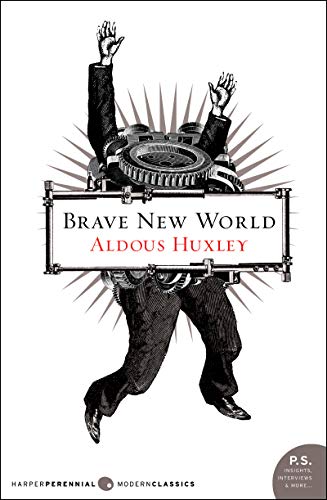Brave New World by Aldous Huxley Link to heading
Summary Link to heading
“Brave New World” is a dystopian novel by Aldous Huxley, published in 1932. The novel is set in a futuristic world state where technology and pharmaceuticals, such as the happiness-inducing drug soma, are employed to control society and maintain stability. Key elements of this society include the manipulation of reproduction, standardized conditioning, and the suppression of individuality and emotion.
The plot revolves around Bernard Marx, an outsider in this conformist world due to his physical and intellectual differences, and his experiences as he questions the values of the World State. Other key characters include Lenina Crowne, John’s “Savage” mother Linda, and John “the Savage,” who was born and raised outside the technologically advanced society. These characters encounter conflicts arising from their interactions and the clash between the “civilized” world and the more natural existence seen in the Savage Reservations.
Review Link to heading
“Brave New World” has been critically acclaimed for its visionary exploration of a future dominated by technology and state control. Huxley’s portrayal of a dystopian world questions the balance between technological advancement and moral decay. One of the book’s strengths is its insightful critique of consumerism, genetic engineering, and the use of technology to enforce conformity. However, some critiques point to the novel’s somewhat dated language and the characters’ occasionally lackluster depth. Despite this, the novel remains a powerful reflection on, and warning about, the potential excesses of state power and technological reliance.
Key Takeaways Link to heading
- Control and Stability: The novel illustrates how technological control can create an artificial sense of stability while destroying individual freedom.
- Conformity vs. Individuality: It highlights the tension between societal pressure to conform and the desire for individual autonomy.
- The Role of Technology: Huxley critiques the potential over-reliance on technology and the sacrifice of human emotions and connections for efficiency and harmony.
- The Pursuit of Happiness: The book questions whether true happiness is achievable through artificial means and at what cost.
Recommendation Link to heading
“Brave New World” is recommended for readers interested in classic dystopian literature and those who appreciate social and political critiques. Fans of works like George Orwell’s “1984” or Ray Bradbury’s “Fahrenheit 451” will likely find “Brave New World” equally thought-provoking. It is particularly suitable for those interested in discussions about the implications of technological advancements and ethical considerations in modern society.
